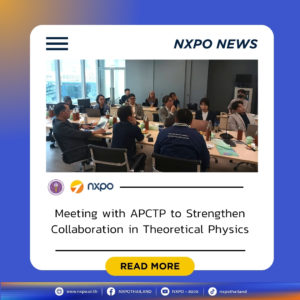Recent Recovery Forum put a spotlight on regional science park, one of the mechanisms driven by Ministry of Higher Education, Science, Research and Innovation (MHESI) to drive the nation’s economic and social development. Asst. Prof. Dr. Tanyanuparb Anantana, Director, Science and Technology Park (STeP) of Chiang Mai University was invited to share his thought and experience under the theme “Regional Science Parks: An Engine for Sustainable Growth in the Post-Pandemic Era”.


Dr. Tanyanuparb first outlined three modes of science park operation, namely science parks that are operated by universities, ones operated by government agencies and ones operated by the private sector. Majority of science parks in Thailand fall into the category of university-operated science park and focus on the strength and expertise of universities. Research activities of science parks generally go beyond the scope of science and technology. The coverage is diverse in order to create innovations that have value to the economy and society, support startups and lead to businesses. Presently, as many as forty-four universities participate in the science park network, including fourteen universities in the north, ten in the south, nine in the upper northeast, nine in the lower northeast and two in the central Thailand.

The challenge of university-operated science park, according to Dr. Tanyanuparb, is the ability to bring together resources and expertise from various faculties and departments to generate business opportunity and enhance competitiveness. The mechanisms employed include IP management, research collaboration and the promotion of startup establishment from research output. STeP has set up NSP INNO STORE as a marketplace for innovative products and services developed by members of STeP’s network. STeP has successfully created a number of innovations for startups such as longan processing technology, products from rice straw and an online service platform.
During the COVID-19 pandemic, STeP and Chiang Mai University launched 5 programs to accelerate the recovery and transition to the new normal. These programs are 1) student volunteer program allowing students to work cooperatively with the communities; 2) learning & working with CMU program creating jobs to absorb unemployment caused by COVID-19; 3) CMU startup program incubating startup businesses through the provision of technology, knowledge and resources; 4) CMU knowhow for all program transferring knowledge and technology to support career development; and 5) CMU pilot plant for value addition program with Innovative Food Fabrication Pilot Plant an RF Technology Pilot Plant for insect control.
NXPO President Dr. Kitipong Promwong praised STeP for its fast development and achievements in less than 10 years of operation. Success factors can be attributed to a strong teamwork and an excellent ecosystem that supports collaboration with local communities. NXPO envisions regional science park as an engine to develop local innovations unique and applicable to each individual region and is in the process of developing working teams to drive this initiative.









